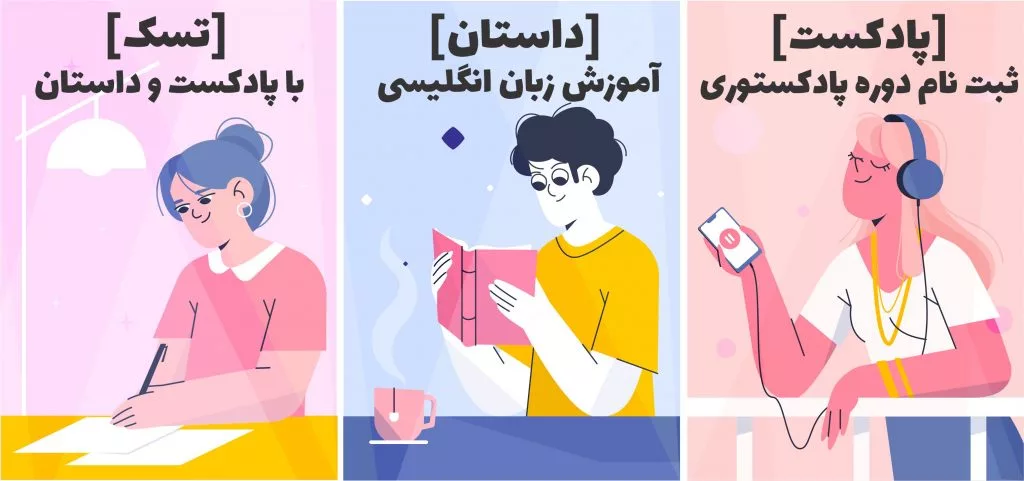پادکست انگلیسی BBC – رشد مغز
در پادکست انگلیسی BBC – رشد مغز ، درمورد رشد مغز انسان صحبت میشه. تا همین اواخر تصور می شد که رشد مغز انسان در اوایل کودکی تمام شده است ، اما تحقیقات در دهه گذشته نشان داده است که مغز در دوران بزرگسالی هنوز در حال تغییر است. این برنامه درون مغز نوجوان قرار می گیرد ، از یک متخصص می شنود و واژگان مفیدی را در طول مسیر برای کشش مغز خود آموزش می دهد!
سوال پادکست انگلیسی BBC – رشد مغز :
There have always been teenagers, but when was the word ‘teenager’ first used to refer to the 13 – 19 age group? Was it:
a) the 1920s
b) the 1930s
c) the 1950s
به پادکست خوب گوش کن تا جواب رو پیدا کنی.
اگر می خوای گوش دادن به پادکست تا حد امکان برات ساده و کارآمد باشه مراحل زیر را دنبال کن:
هر روز به پادکست گوش کن. وقتی براش یه وقت ثابت در روز در نظر بگیری برات تبدیل به عادت میشه و این عادت هرروز پیشرفت میکنه.
پادکستی رو پیدا کن که موضوعش برات جالب باشه. وقتی از خود موضوع لذت ببری یادگیری هم برات لذتبخش میشه.
به پادکستی گوش کن که transcript یا متن داره. این بهت کمک می کنه تا کلمات و عبارات جدید رو به سرعت در متن پیدا کنی و ساختار انواع مختلف جمله رو خوب یاد بگیری.
پس از گوش دادن به پادکست با متن، در مرحله بعدی سعی کن بدون نگاه کردن به متن این کار رو انجام بدی. این کار مهارت شنیداری رو تقویت می کنه و کمک می کنه تا انگلیسی زبانان بومی را راحت تر درک کنی، حتی اگر خیلی سریع صحبت کنن.
اگه به پادکست انگلیسی گوش کردی و نتونستی کامل متوجه اش بشی، ناامید نشو. پادکست هایESL -English as Second Language بیشماری وجود دارن که برای سطوح مختلف، از ابتدایی تا پیشرفته طراحی شدن. مطمئنا هر روز می تونین یه پادکست مناسب با سطح خودت پیدا کنی.
فراموش نکن که هرچی بیشتر تمرین کنی در اون مهارت رشد میکنی! به قول انگلیسی ها: Practice makes perfect
واژگان کلیدی پادکست انگلیسی BBC - رشد مغز
| معنی به فارسی | معنی به انگلیسی | واژه |
| بلوغ | the period in someone’s life when they are developing from a child to an adult | adolescence |
| اوراق | published scientific research | papers |
| عقیده تعصب آمیز | a set of beliefs that are strongly held and which are not challenged | dogma |
| قشر جلوی مغز | an important part of the brain involved in many complex mental actions like planning and personality | prefrontal cortex |
| وظایف شناختی | mental activities that we consciously have to think about like making plans and taking decisions | cognitive tasks |
| بزرگسالی | the adjective to describe behaviour of someone who is in adolescence. Also, the noun for someone who is in adolescence | adolescent |
BBC 6 minute English -The teenage brain

برای دانلود پادکست روی سه نقطه سمت راست کلیک و گزینه Download را انتخاب کنید.
متن پادکست انگلیسی BBC - رشد مغز
Neil
Hello. This is 6 Minute English, I'm Neil.
Rob
And I'm Rob.
Neil
What do you remember of your teenage years?
Rob
Oh, I was a nightmare. I was rude to my parents, always stayed out late, never did my homework, hung out with the wrong people and made lots of bad decisions. How about you, Neil?
Neil
Well, much the same really. People always say that about teenagers, don’t they? That they go through a period where they are out of control and behave badly. But apparently, it’s not their fault. At least not directly.
Rob
So whose fault is it?
Neil
Our brains’, apparently. Teenagers’ brains are still developing in areas that control behaviour, which could mean that you can’t blame them for acting the way they do. Before we find out more, let’s have our question. There have always been teenagers, but when was the word ‘teenager’ first used to refer to the 13 – 19 age group? Was it:
a) the 1920s
b) the 1930s
c) the 1950s
Any ideas, Rob?
RobWell, I think it came along around the time of rock and roll, so that would have made it the 1950s. That’s my guess.
Neil
I'll have the answer later in the programme. Sarah-Jayne Blakemore from University College London specialises in the workings of the brain, particularly the teenage brain. Recently she was a guest on the BBC Radio programme, The Life Scientific. She explained that the understanding that the brain is still developing during the teenage years is quite new. When does she say the first research came out?
Professor Sarah-Jayne Blakemore
The first study showing that the human brain undergoes this very substantial and significant development throughout adolescence and into the twenties; the first papers were published in the late 90s. Before that, and for example when I was at university, the dogma in the text books was that the vast majority of brain development goes on in the first few years of life and nothing much changes after mid-childhood. That dogma is completely false.
NeilSo when did the research into the teenage brain come out?
Rob
Surprisingly, it wasn’t until the late 1990s. This was when she said that the first papers on this subject were published. Papers in this context means the results of scientific research which are published.
Neil
And she didn’t actually talk about teenagers, did she?
Rob
No, that’s right. She talked about the period of adolescence. This noun, adolescence, is the period when someone is developing from a child into an adult and it more or less is the same as the teenage years.
Neil
What I found interesting was that before the 1990s people believed something different about the way our brains develop.
Rob
Yes, Professor Blakemore said that the dogma had been that our brains are mostly fully developed in early childhood, long before adolescence. Dogma is a word used to describe a strong belief that people are expected to accept as true.
Neil
So our brains are still developing much later than was originally thought. What does this tell us about teenage behaviour? Of particular interest is an important part of the brain called the prefrontal cortex. Here is Professor Blakemore again. What excuse can she give for teenagers who don’t get their homework done in time?
Professor Sarah-Jayne Blakemore
The prefrontal cortex is the part of the brain right at the front, just behind the forehead and it’s involved in a whole range of very high-level cognitive tasks such as decision making and planning - we know that this region is undergoing very very large amounts of development during the adolescent years. And so in terms of the expectations that we place on teenagers to, for example, plan their homework, it might be too much given that we know that the region of the brain that critically involved in planning is not developed yet.
Neil
So the prefrontal cortex is important in cognitive tasks. What are those, Rob?
Rob
A cognitive task is one that requires conscious thinking and processing, such as making decisions and planning. It doesn’t happen automatically, you have to think about it. So in the adolescent years this part of the brain is not fully developed. Note the adjective form here of the noun we had earlier adolescence.
Neil
So this gives a good excuse for not doing your homework!
Rob
Ha, ha, I wish I’d known that. I used to say that I’d left my homework on the bus or that the dog had eaten it. Now I could say, "Sorry sir, my brain isn’t developed enough for the cognitive task of planning my homework".
Neil
Yes, I’m sure that would work! Before we wrap up, time to get the answer to this week’s question. I asked when was the word ‘teenager’ first used to refer to the 13 – 19 age group? Was it:
a) the 1920s
b) the 1930s
c) the 1950s
Rob, you said?
Rob
I guessed c) 1950s
Neil
The answer is actually b) the 1930s. Very well done if you knew that. Now a quick review of today’s vocabulary.
Rob
Adolescence is the noun for the period of change from child to adult and the adjective is adolescent – this same word is also the noun for someone who is in that teenage period.
Neil
So an adolescent might be responsible for adolescent behaviour in his or her adolescence.
RobExactly.
Neil
Papers is the word for published scientific research.
Rob
Dogma is strongly held beliefs that are not challenged.
Neil
The prefrontal cortex is an important part of the brain which deals with cognitive tasks.
Rob
And cognitive tasks are mental processes that require active thought and consideration, such as planning and making decisions.
Neil
Well my decision making skills tell me that it’s time to finish.
Rob
Well, your skills are working well Neil. We may be going now but you don't need to – you can listen or watch us again and find lots more learning English materials on our social media platforms. You can also visit our website at bbclearningenglish.com.
Neil
See you soon, goodbye.
RobBye!
امیدوارم از پادکست انگلیسی BBC - رشد مغز لذت برده باشید.
گوش دادن به پادکست روش خوبی برای تقویت مهارت شنیداری و هم چنین یادگرفتن کلمات در بستر یک موضوع خاصه که این به تقویت مهارت مکالمه انگلیسی نیز کمک زیادی می کنه.
اگه تو هم از اون آدمهایی هستی که از گوش دادن به پادکست لذت می بره برات یه خبر خوب دارم! آموزشگاه زبان انگلیسی 24talk یه دوره طراحی کرده مبتنی بر پادکست و داستان کوتاه به اسم "پادکستوری - Podcastory". این دوره سعی کرده یادگیری زبان انگلیسی رو مناسب با نیاز و سطح زبان آموز به یه فرایند بسیار مفرح، موثر، سریع و کم هزینه تبدیل کنه.
همین الان می تونی با کلیک روی عکس زیر و ثبت نام در دوره ی آموزش زبان انگلیسی با پادکست و داستان ۲۴talk اولین و مهم ترین قدم رو برای یادگیری زبان انگلیسی برداری. وقت رو از دست نده!
دوره پادکستوری آکادمی مجازی 24talk
برای شنیدن دیگر پادکست ها، به بخش پادکست در مرکز آموزش رایگان مراجعه نمایید.








